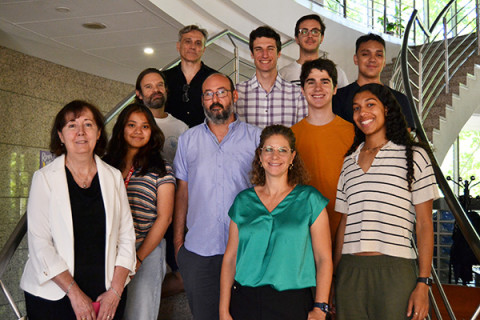The ICMM hosts five students from the Massachusetts Institute of Technology

The Materials Science Institute of Madrid (ICMM-CSIC) is hosting five students from the Massachusetts Institute of Technology (MIT) throughout the summer. These stays are part of the prestigious American center’s MIT-Spain program, which sends its top students to leading institutions in Spain in the fields of research and innovation.
Emily Crespin, Paul Gutkovich, Alice Hall, Matthew Mosqueda, and Spencer Yandrofski are the students chosen for this initial stay: all are undergraduates in various specialties (Physics, Chemical Engineering, Materials Engineering, Aerospace Engineering) and are working alongside Javier Pérez Carvajal, Tobias Stauber, Isabel Montero, and Pedro David García.
“Participating in a training program for students from one of the world’s most prestigious universities not only advances our goal of establishing smooth relationships with renowned international research centers, but also allows us to access highly qualified trainees,” says Jesús Ricote, deputy director of the ICMM.
Sonia López, coordinator of Internationalization at the Institute of Materials Science of Madrid, explains that the selection of MIT and ICMM personnel participating in the project was handled by the office of the program director, Alicia Goldstein Raun, who matched the students' and researchers' interests.
“We are delighted to collaborate with a center of excellence in the field of materials where our students can gain first-hand experience with researchers working on exciting and cutting-edge projects,” says Goldstein, who, during a visit to the center, observed her students' performance at the ICMM facilities. “We hope our students bring new ideas and perspectives to the laboratories where they work, while learning to navigate a new workplace and culture,” she adds.
Ricote continues: “We provide experience in a fundamental research environment in areas related to Physics, Chemistry, or Materials Engineering.” In fact, this activity “not only allows our researchers to engage in training that helps them discover and attract talent to their research groups,” but is also an opportunity to establish links with these students' supervisors, as they are “members of one of the leading institutions in fields of research akin to those we develop.”
MIT-Spain
This year, the MIT-Spain program has placed 40 students (undergraduate and graduate) in 27 leading Spanish institutions (companies, universities, research centers) in innovation and technology, mostly in Madrid and Barcelona, but also in Valencia, Alicante, Ponferrada, and Santiago de Compostela. This project has been running since 2007. “MIT-Spain has provided international experiential learning opportunities to nearly 1,000 students,” adds Goldstein.
“Through these experiences, our students have been able to connect and immerse themselves in Spanish work life and culture while working together to solve some of the world’s greatest challenges,” concludes the program director, who hopes to “continue building strong relationships with our Spanish partners.”
Instituto de Ciencia de Materiales de Madrid (ICMM)
Sor Juana Ines de la Cruz, 3
Cantoblanco, 28049
Madrid, España
Telephone: (+34) 91 334 90 00
Email: @email
Communication Office: @email

Acknowledge the Severo Ochoa Centres of Excellence program through Grant CEX2024-001445-S/ financiado por MICIU/AEI / 10.13039/501100011033

Contacto | Accesibilidad | Aviso legal | Política de Cookies | Protección de datos
